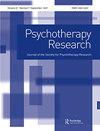Evaluation of male-specific psychoeducation for major depressive disorder compared to cognitive behavioral therapy psychoeducation: A randomized controlled investigation in mentally distressed men.
IF 2.6
1区 心理学
Q2 PSYCHOLOGY, CLINICAL
引用次数: 0
Abstract
Background: Research suggests that male-specific psychotherapy approaches for major depressive disorder (MDD) that consider traditional masculinity ideologies (TMI) may achieve improved treatment efficacy and reduced therapy dropout. However, studies examining male-specific psychotherapy for MDD or specific therapy aspects remain lacking. Methods: An anonymous online study on men's mental health examined 152 self-reporting mentally distressed cisgender men (Mage = 25.5 ± 9.1) from German-speaking countries of Europe. After completing baseline assessments (T1) of state self-esteem, state shame, positive/negative affect, depressive symptoms, and TMI, men were randomly assigned to read either a male-specific (MSP) or a cognitive behavioral therapy-oriented (CBT) psychoeducation text for MDD. Immediately afterwards, participants rated its usefulness and completed follow-up assessments (T2). Results: Men in the MSP condition showed a stronger decrease in shame and negative affect as compared to men in the CBT-psychoeducation condition. Furthermore, in the MSP condition, prototypical depression symptoms tended to increase as compared to the CBT-psychoeducation, whereas male-typical externalizing depression symptoms tended to decrease. Conclusion: MSP for MDD may help depressed men feel less ashamed about their MDD and experience less negative affect about their condition than CBT-psychoeducation. Furthermore, MSP for MDD may elicit a shift from male-typical externalizing depression symptoms to prototypical depression symptoms.针对男性的重度抑郁障碍心理教育与认知行为疗法心理教育的比较评估:针对精神困扰男性的随机对照调查。
背景:研究表明,针对重度抑郁症(MDD)的男性心理治疗方法如果考虑到传统男性意识形态(TMI),可能会提高治疗效果并减少治疗辍学。然而,目前仍缺乏针对重度抑郁症男性心理治疗或特定治疗方面的研究。研究方法一项关于男性心理健康的匿名在线研究调查了来自欧洲德语国家的152名自我报告有精神困扰的顺性别男性(Mage = 25.5 ± 9.1)。在完成状态自尊、状态羞愧、积极/消极情绪、抑郁症状和 TMI 的基线评估(T1)后,男性被随机分配阅读男性专用(MSP)或认知行为疗法导向(CBT)的 MDD 心理教育文本。之后,参与者立即对其实用性进行评分,并完成后续评估(T2)。结果显示与接受 CBT 心理教育的男性相比,接受 MSP 的男性在羞耻感和负面情绪方面的下降幅度更大。此外,在 MSP 条件下,与 CBT 心理教育相比,原型抑郁症状呈上升趋势,而男性典型外化抑郁症状呈下降趋势。结论与 CBT 心理教育相比,治疗 MDD 的 MSP 可帮助抑郁男性减轻对 MDD 的羞耻感,并减少对自身状况的负面影响。此外,针对 MDD 的 MSP 可能会促使男性从典型的外化性抑郁症状转变为典型的抑郁症状。
本文章由计算机程序翻译,如有差异,请以英文原文为准。
求助全文
约1分钟内获得全文
求助全文
来源期刊

Psychotherapy Research
PSYCHOLOGY, CLINICAL-
CiteScore
7.80
自引率
10.30%
发文量
68
期刊介绍:
Psychotherapy Research seeks to enhance the development, scientific quality, and social relevance of psychotherapy research and to foster the use of research findings in practice, education, and policy formulation. The Journal publishes reports of original research on all aspects of psychotherapy, including its outcomes, its processes, education of practitioners, and delivery of services. It also publishes methodological, theoretical, and review articles of direct relevance to psychotherapy research. The Journal is addressed to an international, interdisciplinary audience and welcomes submissions dealing with diverse theoretical orientations, treatment modalities.
 求助内容:
求助内容: 应助结果提醒方式:
应助结果提醒方式:


